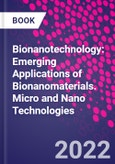Bionanotechnology: Emerging Applications of Bionanomaterials highlights a wide range of industrial applications using bionanotechnologies, with biomedical applications prominent amongst these, including drug delivery, tissue engineering, wound healing, medical implants, medical diagnostics and therapy. Other key areas include energy harvesting and storage, water/waste treatment, papermaking, textiles, construction industry, automotive, aerospace. This book is a valuable resource for all those seeking to gain a fundamental understanding of how bionanomaterials are used in a variety of industry sectors.
Bionanomaterials are molecular materials composed partially or completely of biological molecules - such as proteins, enzymes, viruses, DNA and biopolymers - as well as metal, metal oxides, and carbon nanomaterials. Bionanomaterials have drawn much attention for their use in a wide range of industrial applications, including scaffolds, dental implants, drug delivery, dialysis, biobatteries, biofuel cells, air purification, and water treatment.
Please Note: This is an On Demand product, delivery may take up to 11 working days after payment has been received.
Table of Contents
Part 1: Energy production and Energy Storage
1. Bionanomaterials for biofuel cells
2. Bionanomaterials for enzymatic fuel cells�
3. Bionanomaterials for bacterial fuel cells
4. Bionanomaterials for microbial fuel cells�
5. Bionanomaterials for biobatteries�
Part 2: Environmental applications
6. Bionanomaterials for membrane applications
7. Bionanomaterials for wastewater treatment
8. Bioinspired interfaces for self-cleaning technologies
9. Bionanomaterials for soil remediation
10. Bionanomaterials for air filtration and purification���
Part 3: Biomedical applications
11. Bionanomaterials for drug delivery
12. Bionanomaterials for tissue engineering
13. Bionanomaterials for medical implants
14. Bionanomaterials for health care
15. Bionanomaterials for biosensor applications
16. Bionanomaterials for cosmetics and pharmaceuticals
17. Bionanomaterials for cancer treatment
18. Bionanomaterials for wound healing
19. Bionanomaterials for dialysis��
20. Nanomaterials for bioimaging����
Part 4: Constructions and other applications
21. Self-clearing and antimicrobial nanocoatings
22. Bioactive nanomaterials for food packaging�
23. Bioactive nanomaterials in military protective clothing
24. Multifunctional antimicrobial nanopapers���
25. Multifunctional medical textiles
26. Challenges and future aspects for industrial use of bionanomaterials








